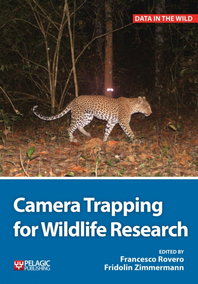
Camera trapping is a powerful and now widely used tool in scientific research on wildlife ecology and management. It provides a unique opportunity for collecting knowledge, investigating the presence of animals, or recording and studying behaviour. Its visual nature makes it easy to successfully convey findings to a wide audience.
The new book provides a much-needed guide to the sound use of camera trapping for the most common ecological applications to wildlife research. Each phase involved in the use of camera trapping is covered:
- Selecting the right camera type
- Set-up and field deployment of your camera trap
- Defining the sampling design: presence/absence, species inventory, abundance; occupancy at species level; capture-mark-recapture for density estimation; behavioural studies; community-level analysis
- Data storage, management and analysis for your research topic, with illustrative examples for using R and Excel
- Using camera trapping for monitoring, conservation and public engagement.
Each chapter in this edited volume is essential reading for students, scientists, ecologists, educators and professionals involved in wildlife research or management.
Find out more in the promotional video.
About the authors
Francesco Rovero is an ecologist and conservation scientist with a PhD in animal ecology. He is currently the Curator for Tropical Biodiversity at MUSE Science Museum in Trento, Italy.
Fridolin Zimmermann is a carnivore conservation scientist with a PhD on Eurasian lynx conservation and ecology. He is currently coordinator of the large carnivore monitoring in Switzerland at Carnivore Ecology and Wildlife Management (KORA).
Collectively they have nearly 30 years of professional experience in the use of camera trapping for wildlife research, and have worked on a range of species, habitat and study types.




 RSS news
RSS news Print this article
Print this article
